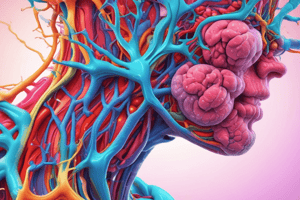Podcast
Questions and Answers
What is the primary function of melanocyte-stimulating hormone (MSH)?
What is the primary function of melanocyte-stimulating hormone (MSH)?
- Stimulates white blood cell production
- Regulates calcium levels in the blood
- Increases the metabolism of thyroid hormones
- Promotes melanin production in melanocytes (correct)
Where is the thyroid gland located in relation to the thyroid cartilage of the larynx?
Where is the thyroid gland located in relation to the thyroid cartilage of the larynx?
- Lateral to the thyroid cartilage
- Inferior to the thyroid cartilage (correct)
- Anterior to the thyroid cartilage
- Superior to the thyroid cartilage
What type of cells does MSH directly influence?
What type of cells does MSH directly influence?
- Keratinocytes
- Fibroblasts
- Melanocytes (correct)
- Adipocytes
Which part of the pituitary gland releases melanocyte-stimulating hormone?
Which part of the pituitary gland releases melanocyte-stimulating hormone?
What is NOT a typical function of the thyroid gland?
What is NOT a typical function of the thyroid gland?
What is the primary function of erythropoietin (EPO)?
What is the primary function of erythropoietin (EPO)?
Which of the following substances is responsible for calcium and phosphate absorption in the digestive tract?
Which of the following substances is responsible for calcium and phosphate absorption in the digestive tract?
Where does erythropoietin (EPO) primarily exert its effects?
Where does erythropoietin (EPO) primarily exert its effects?
Which process is primarily stimulated by calcitriol?
Which process is primarily stimulated by calcitriol?
What would likely occur if there is a deficiency of erythropoietin (EPO)?
What would likely occur if there is a deficiency of erythropoietin (EPO)?
What is the outermost layer of the digestive tract in the peritoneal cavity?
What is the outermost layer of the digestive tract in the peritoneal cavity?
Which layer of the digestive tract contains areolar tissue?
Which layer of the digestive tract contains areolar tissue?
What composes the mucosa layer of the digestive tract?
What composes the mucosa layer of the digestive tract?
Which layer of the digestive tract primarily consists of smooth muscle fibers?
Which layer of the digestive tract primarily consists of smooth muscle fibers?
Which feature is NOT a major layer of the digestive tract?
Which feature is NOT a major layer of the digestive tract?
What type of cells are found in the pineal gland that synthesize melatonin?
What type of cells are found in the pineal gland that synthesize melatonin?
Which hormone is primarily produced by the pineal gland?
Which hormone is primarily produced by the pineal gland?
What is the primary function of melatonin synthesized in the pineal gland?
What is the primary function of melatonin synthesized in the pineal gland?
What anatomical term is used to refer to the pineal gland?
What anatomical term is used to refer to the pineal gland?
Which of the following statements is true regarding the pineal gland?
Which of the following statements is true regarding the pineal gland?
What type of muscle tissue is primarily found in the digestive system?
What type of muscle tissue is primarily found in the digestive system?
How are muscle cells in the digestive system arranged?
How are muscle cells in the digestive system arranged?
What is true about the innervation of the muscle cells in the digestive system?
What is true about the innervation of the muscle cells in the digestive system?
Which characteristic best defines visceral smooth muscle tissue in the digestive system?
Which characteristic best defines visceral smooth muscle tissue in the digestive system?
What distinguishes smooth muscle from skeletal muscle in the context of the digestive system?
What distinguishes smooth muscle from skeletal muscle in the context of the digestive system?
Which of the following enzymes are produced by the pancreas?
Which of the following enzymes are produced by the pancreas?
What hormones are primarily produced by the endocrine portion of the pancreas?
What hormones are primarily produced by the endocrine portion of the pancreas?
What is the primary function of lipases in the pancreas?
What is the primary function of lipases in the pancreas?
Which enzyme category does NOT include components produced by the pancreas?
Which enzyme category does NOT include components produced by the pancreas?
Which statement about pancreatic hormones is accurate?
Which statement about pancreatic hormones is accurate?
Flashcards
Melanocyte-stimulating hormone (MSH)
Melanocyte-stimulating hormone (MSH)
A hormone that stimulates melanocytes to make melanin.
Pars intermedia
Pars intermedia
The part of the pituitary gland that releases MSH.
Melanocytes
Melanocytes
Cells that produce melanin.
Melanin
Melanin
Signup and view all the flashcards
Thyroid Gland Location
Thyroid Gland Location
Signup and view all the flashcards
EPO function
EPO function
Signup and view all the flashcards
Calcitriol function
Calcitriol function
Signup and view all the flashcards
EPO Location
EPO Location
Signup and view all the flashcards
Calcitriol Location
Calcitriol Location
Signup and view all the flashcards
Bone Marrow Role
Bone Marrow Role
Signup and view all the flashcards
Pineal Gland
Pineal Gland
Signup and view all the flashcards
Pinealocytes
Pinealocytes
Signup and view all the flashcards
Secretion by pinealocytes
Secretion by pinealocytes
Signup and view all the flashcards
Synthesis of melatonin
Synthesis of melatonin
Signup and view all the flashcards
Digestive Tract Layers
Digestive Tract Layers
Signup and view all the flashcards
Mucosa Layer
Mucosa Layer
Signup and view all the flashcards
Submucosa Layer
Submucosa Layer
Signup and view all the flashcards
Muscularis Externa
Muscularis Externa
Signup and view all the flashcards
Serosa Layer
Serosa Layer
Signup and view all the flashcards
Visceral smooth muscle
Visceral smooth muscle
Signup and view all the flashcards
Sheets of muscle
Sheets of muscle
Signup and view all the flashcards
No motor innervation
No motor innervation
Signup and view all the flashcards
Digestive system function
Digestive system function
Signup and view all the flashcards
Involuntary muscle
Involuntary muscle
Signup and view all the flashcards
Pancreas
Pancreas
Signup and view all the flashcards
Pancreatic Enzymes
Pancreatic Enzymes
Signup and view all the flashcards
Lipases
Lipases
Signup and view all the flashcards
Insulin
Insulin
Signup and view all the flashcards
Glucagon
Glucagon
Signup and view all the flashcards
Study Notes
Endocrine System
- The endocrine and nervous systems work together to regulate homeostasis.
- The nervous system handles short-term "crisis management".
- The endocrine system manages longer-term metabolic functions through hormones.
- Endocrine cells release hormones into interstitial fluid, affecting target cells.
Endocrine System Overview
- Endocrine system consists of all endocrine cells and tissues.
- Hormones are categorized by chemical structure: amino acid derivatives, peptide hormones, steroids, and eicosanoids.
- Hormone activity is regulated by neural activity, sometimes positive feedback, but mostly complex negative feedback.
Hypothalamus and Endocrine Regulation
- The hypothalamus regulates endocrine and neural activities.
- It controls the adrenal medulla (a component of the sympathetic nervous system).
- It makes hormones (ADH and oxytocin), released by the neurohypophysis (posterior lobe).
- It controls the adenohypophysis (anterior lobe).
Pituitary Gland
- The pituitary gland produces nine peptide hormones.
- Some are produced by the hypothalamus and released at the neurohypophysis.
- Other hormones are produced by the adenohypophysis.
Neurohypophysis
- The neurohypophysis contains axons of hypothalamic neurons.
- Neurons produce hormones like antidiuretic hormone (ADH) and oxytocin.
- ADH decreases water loss in the kidneys.
- Oxytocin affects uterus and mammary glands.
Adenohypophysis
- The adenohypophysis has different parts (pars distalis, pars intermedia, and pars tuberalis).
- It's highly vascularised.
- Hypothalamic regulatory factors (releasing and inhibiting hormones) control its endocrine cells.
Pituitary Hormones
- TSH (thyroid-stimulating hormone) triggers thyroid hormone release.
- ACTH (adrenocorticotropic hormone) stimulates glucocorticoid release.
- FSH (follicle-stimulating hormone) regulates estrogen/sperm production.
- LH (luteinizing hormone) controls ovulation and hormone production.
- PRL (prolactin) aids in mammary gland development and milk production.
- GH (growth hormone) stimulates cell growth and replication.
- MSH (melanocyte-stimulating hormone) stimulates melanin production.
Thyroid Gland
- The thyroid gland is positioned below the thyroid cartilage.
- It has two lobes connected by an isthmus.
- Follicular cells make thyroglobulin and thyroid hormones (T3 and T4).
- TSH stimulates the release of these hormones.
Thyroid Follicles and Thyroid Hormones
- Thyroid follicles contain thyroglobulin with thyroid hormones.
- Thyroid hormones (T3 and T4) are released into the circulation.
C Thyrocytes of the Thyroid Gland
- Follicular cells make calcitonin.
- Calcitonin reduces calcium ion concentration in fluids.
- Calcitonin works opposite to parathyroid hormone.
Parathyroid Glands
- Four parathyroid glands are on the thyroid.
- Principle cells produce parathyroid hormone (PTH) to increase calcium.
- PTH increases osteoclast activity, limits calcium loss via urine, and promotes calcium absorption.
Thymus
- The thymus produces thymosins, promoting immune system development.
Suprarenal Glands
- The suprarenal glands rest above each kidney.
- The cortex makes corticosteroids (mineralocorticoids, glucocorticoids, and androgens).
- The medulla makes epinephrine and norepinephrine.
Endocrine Functions of Kidneys and Heart
- Kidney cells produce renin, erythropoietin, and calcitriol.
- Renin helps regulate blood pressure.
- Erythropoietin increases red blood cell production.
- Calcitriol controls calcium/phosphate absorption.
- Heart cells produce ANP and BNP to regulate blood volume/pressure.
Pancreas (Digestive/Endocrine)
- The pancreas makes exocrine and endocrine secretions.
- Islets of Langerhans (clusters of cells) produce hormones like insulin and glucagon.
- Insulin lowers blood glucose.
- Glucagon raises blood glucose (increases glycogen breakdown, glucose synthesis).
- Somatostatin inhibits insulin and glucagon.
Digestive System/Endocrine
- Digestive tract, liver, and pancreas produce exocrine secretions.
- These are essential for digestion and absorption.
Testes
- Interstitial cells in the testes produce androgens like testosterone.
- Testosterone affects sperm production, secondary sexual characteristics, influences the reproductive tract, and stimulates muscle growth.
- Inhibin, made by nurse cells, interacts with FSH from the anterior pituitary.
Ovaries
- Oocytes develop in follicles.
- Follicle cells produce estrogens (estradiol).
- Estrogen helps with oocyte maturation, uterine lining growth.
- Inhibin controls FSH release.
- After ovulation, corpus luteum makes estrogens and progestins (progesterone).
- Progesterone prepares the uterus for implantation.
Pineal Gland
- Pinealocytes in the pineal gland produce melatonin, a hormone that influences circadian rhythms and reduces reproductive hormone production.
Hormones and Aging
- The endocrine system shows relatively few changes with age.
- The most significant changes are puberty associated hormone increases and the menopause-related hormone decreases.
Clinical Terms (Endocrine)
- Diabetes insipidus
- Diabetes mellitus (Type 1/Type 2)
- Goiter
- Myxedema
Studying That Suits You
Use AI to generate personalized quizzes and flashcards to suit your learning preferences.




